Introduction: Unlocking Nature’s Nootropics
In a world increasingly captivated by the pursuit of optimal health and mental clarity, the fascination with natural brain boosters has intensified. Among the most compelling contenders in this category are mushrooms—ancient fungi celebrated not only for their culinary appeal but also for their wide-ranging medicinal properties. As modern science intersects with traditional wisdom, the spotlight has turned toward identifying the top 10 healthiest mushrooms for cognitive power and brain vitality. These exceptional fungi hold promise for enhancing memory, focus, mood, and overall neurological function.
This comprehensive guide delves into the fascinating realm of functional and nootropic mushrooms, examining their unique bioactive compounds, their scientifically supported brain-boosting benefits, and how to integrate them into your diet for maximum effect. From well-known varieties like Lion’s Mane and Reishi to lesser-known treasures such as Cordyceps and Enokitake, these mushrooms offer an impressive array of neuroprotective and cognitive-enhancing benefits. As we explore each of the top mushrooms for health, you’ll discover not just what makes them powerful but how they can be a practical and enjoyable part of your nutritional strategy.
You may also like: The Ultimate Guide to the Best Nootropic Mushrooms for Memory and Cognitive Enhancement
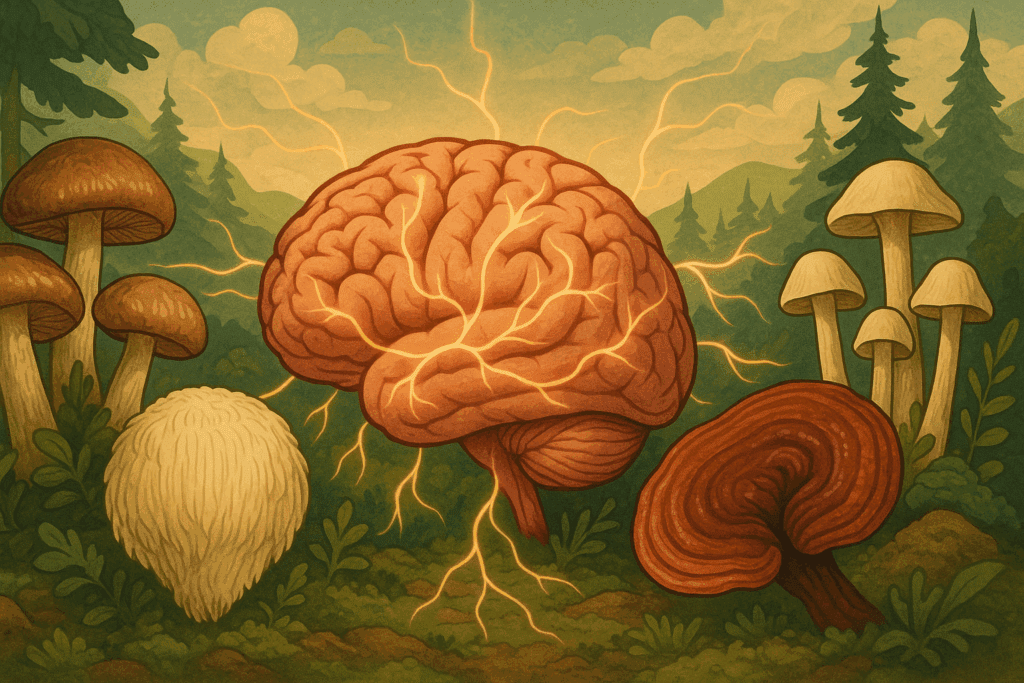
Why Mushrooms Matter for Brain Health
Mushrooms are biologically distinct organisms that occupy a unique space between the plant and animal kingdoms. This unusual classification is matched by their equally extraordinary health benefits. What makes mushrooms particularly exciting in the context of brain health is their concentration of polysaccharides, antioxidants, terpenoids, and unique neurotrophic compounds that support cognitive function.
One of the most significant findings in recent years is the presence of hericenones and erinacines in Lion’s Mane mushrooms—compounds that can stimulate the synthesis of Nerve Growth Factor (NGF), a crucial protein for the maintenance, survival, and regeneration of neurons. Similarly, many mushrooms contain ergothioneine and glutathione, potent antioxidants that protect brain cells from oxidative stress, a key contributor to neurodegenerative diseases like Alzheimer’s and Parkinson’s.
Additionally, certain mushrooms possess anti-inflammatory properties that reduce systemic inflammation, including in the brain. Chronic inflammation has been linked to cognitive decline and mood disorders, making mushrooms a powerful dietary ally. These fungi are also adaptogens, helping the body and mind adapt to stress and restore balance, particularly important in today’s fast-paced lifestyle where mental fatigue is a common issue.
The Science Behind Mushroom Nootropics
Nootropics are substances that enhance cognitive performance without causing significant side effects. While synthetic nootropics like modafinil have gained popularity, natural alternatives such as medicinal mushrooms are increasingly viewed as safer, sustainable, and holistic options. These mushrooms work synergistically with the body to optimize brain function over time rather than providing a quick but temporary fix.
The top mushrooms for health often share several mechanisms of action. They support neurogenesis, the process of generating new neurons; improve synaptic plasticity, which is vital for learning and memory; and enhance mitochondrial function, which increases brain energy metabolism. Furthermore, many nootropic mushrooms exhibit immunomodulatory effects that indirectly benefit mental clarity by reducing physical and psychological stress.
Several studies have shown that mushroom supplementation can improve working memory, attention span, and even emotional regulation. The cumulative effect is a sharper, more resilient brain capable of handling complex tasks and recovering from cognitive stress more effectively. As we move into our detailed analysis, keep in mind that the health benefits described are most potent when mushrooms are consumed consistently and as part of a balanced lifestyle.
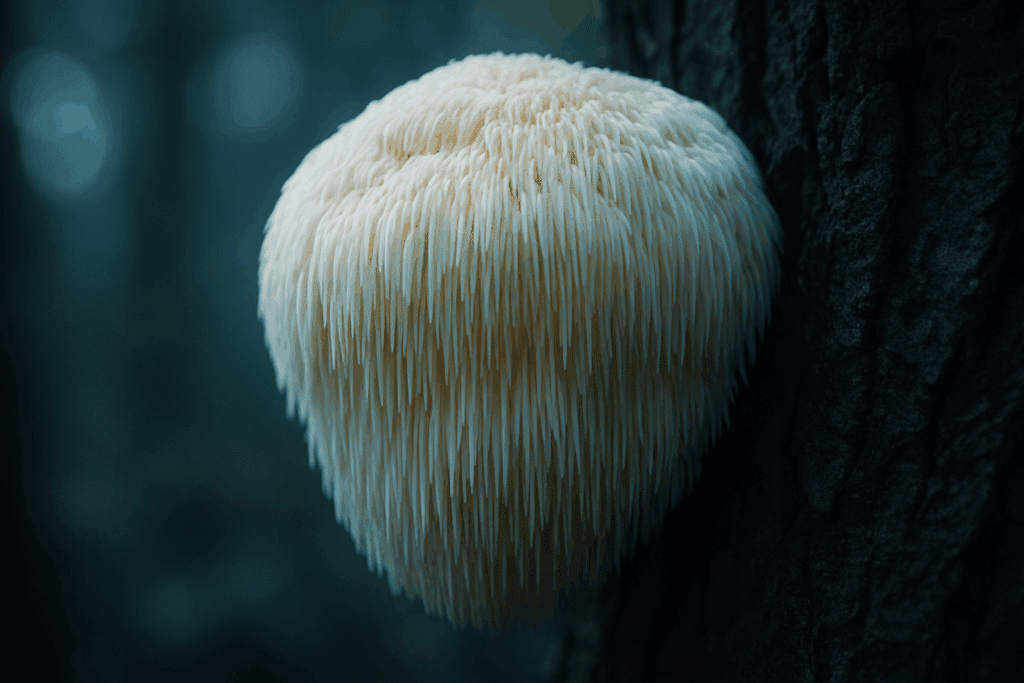
Lion’s Mane: The Neurogenesis Champion
Lion’s Mane (Hericium erinaceus) is arguably the crown jewel of cognitive-enhancing mushrooms. Recognizable by its cascading, icicle-like spines, this mushroom has been used for centuries in traditional Chinese medicine to support mental clarity and neurological health. What sets Lion’s Mane apart is its unique ability to promote the production of Nerve Growth Factor (NGF), a protein that plays a vital role in the development, function, and survival of neurons.
Scientific studies have demonstrated that compounds within Lion’s Mane, particularly hericenones and erinacines, stimulate NGF synthesis in the brain. This translates to improved cognitive functions such as memory retention, focus, and problem-solving abilities. In one double-blind placebo-controlled study, older adults with mild cognitive impairment showed significant improvement in cognitive function after 16 weeks of Lion’s Mane supplementation.
Beyond memory enhancement, Lion’s Mane has shown promise in reducing symptoms of anxiety and depression, likely due to its influence on hippocampal neurogenesis and anti-inflammatory properties. It also protects against neurodegeneration by reducing amyloid-beta plaques, a hallmark of Alzheimer’s disease. Whether consumed as a powder, capsule, or in culinary dishes, Lion’s Mane stands as one of the best mushrooms to eat for brain health.
Reishi: The Calming Adaptogen
Reishi (Ganoderma lucidum), often referred to as the “Mushroom of Immortality,” is best known for its adaptogenic properties that help the body manage stress, a key contributor to cognitive decline. While not as directly stimulating as Lion’s Mane, Reishi’s indirect effects on brain health are profound and well-documented.
Reishi contains triterpenoids, polysaccharides, and peptidoglycans—compounds that work together to reduce inflammation, bolster the immune system, and improve sleep quality. Better sleep and reduced stress levels are critical for maintaining long-term cognitive vitality. Chronic stress releases cortisol, which, in high amounts, can impair memory and reduce the size of the hippocampus, the brain’s memory center.
Studies also show that Reishi can improve mood and reduce fatigue, which in turn supports cognitive performance. Regular intake of Reishi supplements has been associated with enhanced focus and greater emotional resilience. Given its calming properties and support for systemic health, Reishi is one of the healthiest mushrooms to eat for maintaining brain function under pressure.

Cordyceps: The Energy Enhancer
Cordyceps (Cordyceps militaris and Cordyceps sinensis) are parasitic fungi traditionally found growing on insect larvae. While their origin may seem unappealing, their benefits for brain and physical performance are extraordinary. Cordyceps are revered for their ability to increase ATP (adenosine triphosphate) production, which fuels cellular energy, including in the brain.
Enhanced ATP production means greater mental stamina, improved alertness, and a heightened ability to perform cognitively demanding tasks. Cordyceps also improve oxygen utilization, which is especially beneficial for athletes and individuals in high-performance professions. More oxygen to the brain translates to better focus and reduced mental fatigue.
This mushroom’s adaptogenic qualities also help modulate the body’s stress response, balancing cortisol levels and enhancing mood. In traditional Chinese medicine, Cordyceps have been used to treat fatigue and improve vitality, and modern research is beginning to validate these claims. For those seeking the best mushrooms to eat for health and energy, Cordyceps offer a dynamic and versatile option.
Chaga: The Antioxidant Giant
Chaga (Inonotus obliquus) is a sclerotium-forming fungus primarily found growing on birch trees in cold climates. Its gnarled, charcoal-like exterior belies a rich interior filled with potent antioxidants, particularly melanin and superoxide dismutase. These compounds play a critical role in reducing oxidative stress in the brain, one of the primary contributors to cognitive decline.
Oxidative stress leads to neuronal damage and has been implicated in a wide range of neurodegenerative diseases. By neutralizing free radicals, Chaga protects brain cells and supports long-term mental clarity. Chaga also modulates immune function and inflammation, both of which influence cognitive performance and emotional well-being.
Though less studied than Lion’s Mane or Reishi, Chaga’s high antioxidant content makes it one of the best mushrooms to eat for health, particularly for those interested in preventive care. It can be consumed as a tea, tincture, or powder, and pairs well with other nootropic mushrooms for a synergistic effect.
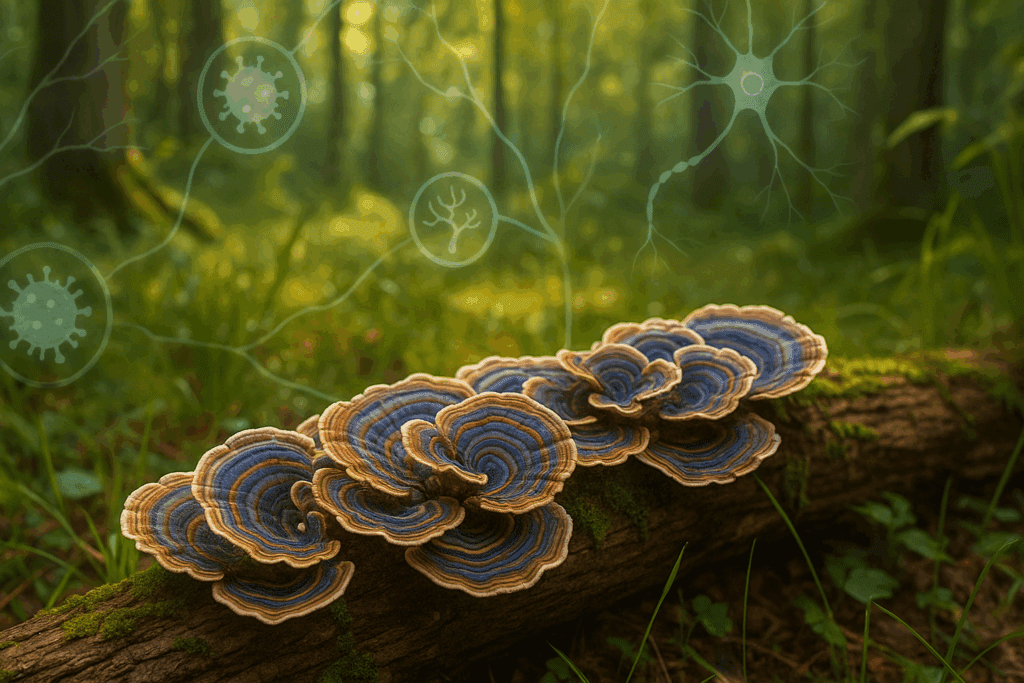
Turkey Tail: The Immune-Boosting Ally
Turkey Tail (Trametes versicolor) is aptly named for its colorful, fan-shaped appearance resembling a wild turkey’s tail. While often celebrated for its immune-modulating properties, its benefits extend to brain health as well. A healthy immune system is foundational to cognitive resilience, and Turkey Tail excels at maintaining immune balance.
One of Turkey Tail’s standout features is its rich content of beta-glucans, which activate immune cells and help the body fight off infections and inflammation. Inflammation is a silent saboteur of cognitive performance, making Turkey Tail a valuable ally for long-term brain vitality. It also contains prebiotic compounds that nourish the gut microbiome—a system increasingly linked to mood and cognition.
Research suggests that the gut-brain axis plays a significant role in mental health. By supporting a healthy microbiome, Turkey Tail indirectly enhances emotional stability, focus, and memory. As one of the top mushrooms for health, it offers a multi-system approach to cognitive enhancement that is both effective and sustainable.
Shiitake: The Nutritional Powerhouse
Shiitake mushrooms (Lentinula edodes) are a staple in Asian cuisine and have been prized for their savory flavor and impressive nutrient profile. While not always categorized as a nootropic, their contribution to overall health directly impacts cognitive well-being. Shiitake is rich in B vitamins, particularly B5 and B6, which are essential for neurotransmitter synthesis and energy metabolism.
The presence of eritadenine and beta-glucans in Shiitake also supports cardiovascular health by lowering cholesterol and improving circulation. Enhanced blood flow to the brain ensures a steady supply of oxygen and nutrients, vital for maintaining sharp mental faculties. Additionally, Shiitake contains polysaccharides that bolster immune function and reduce systemic inflammation.
From a culinary standpoint, Shiitake is among the healthiest mushrooms to cook and eat regularly. Its versatility and robust umami flavor make it an easy addition to soups, stir-fries, and grain bowls. When considering the best mushrooms to eat for health, Shiitake earns its place not just for its taste but also for its functional benefits.
Maitake: The Blood Sugar Stabilizer for Brain Resilience
Maitake (Grifola frondosa), often called “Hen of the Woods,” is a frilly, fan-like mushroom that grows in clusters at the base of trees, especially oaks. Revered in traditional Japanese medicine and increasingly recognized in modern nutritional science, Maitake is rich in beta-glucans that help modulate the immune system and regulate blood sugar levels—both of which are essential to brain function. Stable blood sugar is directly tied to mood, concentration, and memory retention, making Maitake one of the healthiest mushrooms to eat for consistent cognitive performance.
Fluctuations in blood glucose can lead to brain fog, irritability, and poor decision-making. Maitake addresses this issue through its ability to enhance insulin sensitivity and support metabolic balance. It has also demonstrated potential in reducing inflammation and oxidative damage, two primary drivers of neurodegenerative decline. Its neuroprotective properties, while indirect, create an environment in which the brain can operate more efficiently and age more gracefully.
Maitake is also a natural source of vitamin D, particularly when sun-dried, and this vitamin plays a critical role in mental health. Deficiency in vitamin D has been associated with increased risks of depression, cognitive impairment, and dementia. When included in meals such as stews, risottos, or sautéed vegetable medleys, Maitake offers a flavorful and functional boost to both physical and mental well-being.
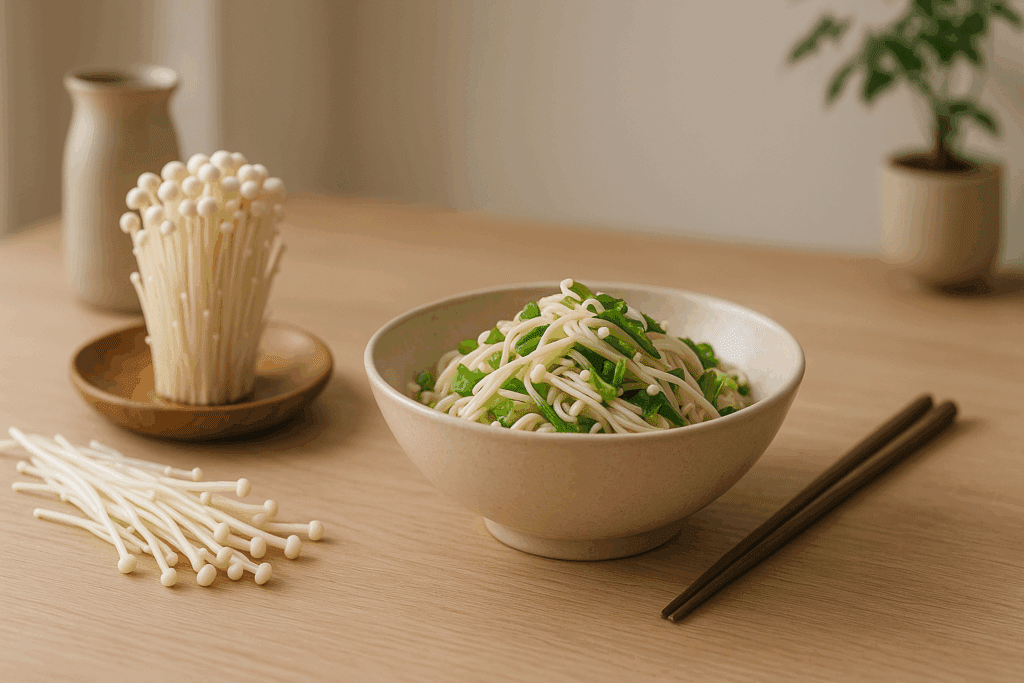
Enokitake: The Delicate Powerhouse with Cognitive Perks
Enokitake (Flammulina velutipes), commonly known as Enoki, is easily recognizable by its long, slender stems and small white caps. Though it appears delicate, it delivers a surprisingly potent array of health benefits that support brain health. Popular in East Asian cuisine, Enoki mushrooms have been linked to reduced rates of cancer and enhanced cognitive performance, especially in populations that consume them regularly as part of their cultural diets.
One of Enoki’s standout features is its high concentration of antioxidants and polysaccharides that combat inflammation and support the immune system. Research has shown that Enoki extract can enhance memory and learning by modulating the activity of neurotransmitters such as acetylcholine and dopamine, both of which are critical for concentration, motivation, and short-term memory formation. These mechanisms make Enoki one of the top mushrooms for health-conscious individuals seeking to protect and optimize their cognitive abilities.
Enokitake also contributes to gut health through its prebiotic fibers, which support the beneficial bacteria that influence the gut-brain axis. A well-regulated microbiome can translate into better mood stability and stress resilience, key components of cognitive vitality. Because Enoki has a mild taste and versatile texture, it is easily added to soups, noodle dishes, and salads, making it one of the best mushrooms to eat for health without overpowering other flavors.
Porcini: The Culinary Treasure with Brain-Protective Power
Porcini (Boletus edulis) is a mushroom prized in gourmet kitchens around the world for its rich, nutty flavor and meaty texture. But beyond its culinary prestige, Porcini is also an unsung hero among the top 10 healthiest mushrooms for cognitive power and brain vitality. Rich in polyphenols, selenium, and ergothioneine, Porcini mushrooms offer an antioxidant profile that rivals many of the more widely known nootropic fungi.
One of Porcini’s major brain health advantages comes from its ability to combat free radicals and support mitochondrial health. Mitochondria are the energy-producing structures in cells, and their efficiency directly affects the brain’s ability to function under pressure. By enhancing mitochondrial activity and reducing oxidative stress, Porcini mushrooms help to preserve mental stamina, reduce cognitive fatigue, and support long-term brain resilience.
Additionally, Porcini contains anti-inflammatory compounds that may inhibit the production of pro-inflammatory cytokines known to damage neural tissue. This function is particularly valuable for aging individuals or anyone facing chronic stress. Though fresh Porcini can be hard to find, dried versions retain most of their nutritional potency and can be rehydrated for use in risottos, sauces, and broths, making them one of the healthiest mushrooms to cook for both brain and body.
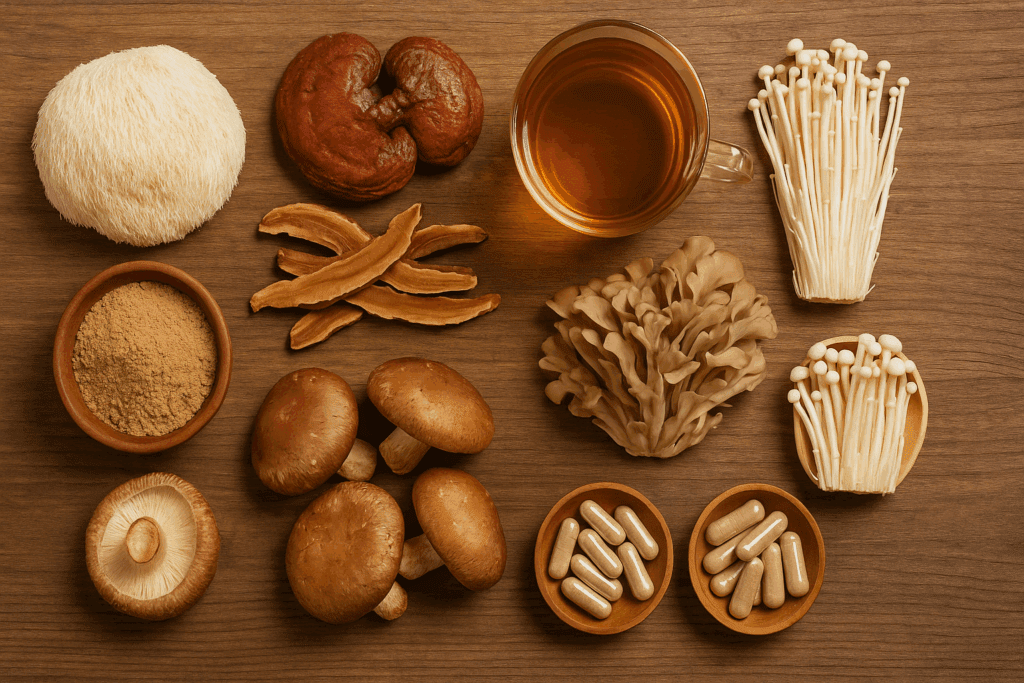
How to Incorporate the Top 10 Healthiest Mushrooms Into Your Diet
Knowing which fungi make the list of the top 10 healthiest mushrooms for cognitive power and brain vitality is only the beginning. To harness their full potential, it’s essential to integrate them into your routine in a sustainable and enjoyable way. The simplest method is to cook with fresh or dried varieties whenever possible, as many mushrooms are naturally rich in umami, adding both flavor and function to meals.
For those with busy lifestyles or limited access to specialty groceries, mushroom powders, capsules, and tinctures offer a convenient alternative. These forms retain most of the beneficial compounds, especially when sourced from reputable manufacturers using hot water or dual extraction methods. Lion’s Mane, Reishi, and Cordyceps are particularly popular as powdered supplements mixed into smoothies, coffee, or teas.
Rotating mushroom types ensures that you’re getting a diverse array of benefits—from NGF stimulation and immune modulation to improved blood circulation and antioxidant defense. Some combinations, such as Reishi and Cordyceps or Lion’s Mane and Chaga, offer synergistic effects that amplify cognitive benefits. Whether used in traditional recipes or modern wellness formats, the healthiest mushrooms to eat are those you can enjoy regularly and in a variety of preparations.
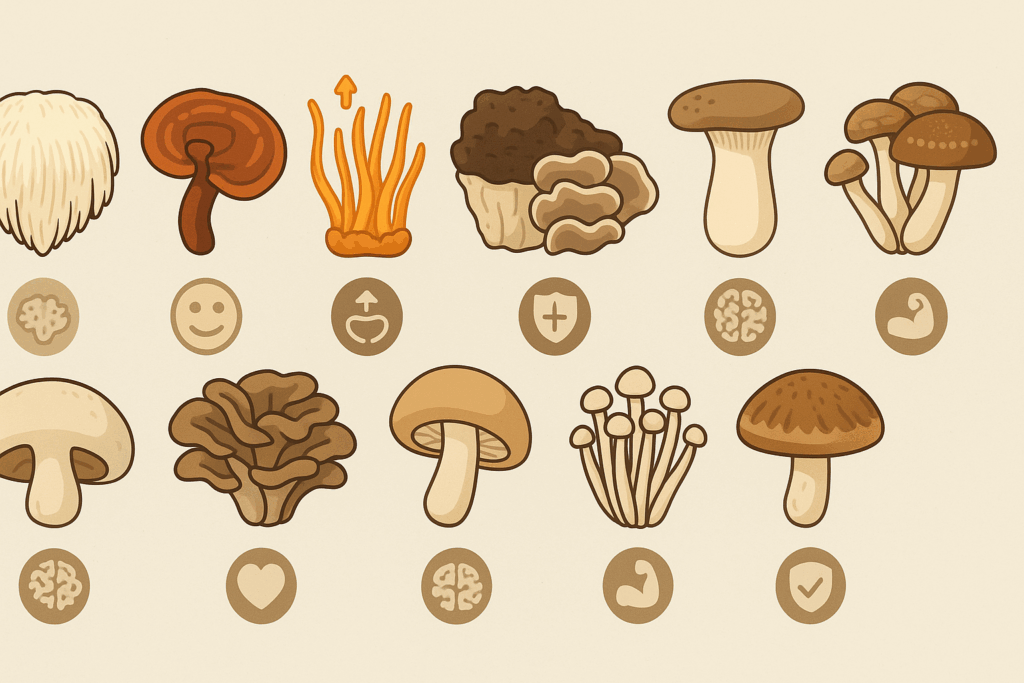
The Top 10 Healthiest Mushrooms for Cognitive Power and Brain Vitality: Final Ranking
Let’s revisit and rank the top mushrooms for health based on their cognitive benefits, nutritional profile, and adaptability for regular consumption:
- Lion’s Mane – unmatched in stimulating neurogenesis
- Reishi – stress-reducing adaptogen with mood-stabilizing benefits
- Cordyceps – energy-enhancing and brain oxygenating
- Chaga – antioxidant-rich and neuroprotective
- Turkey Tail – immune modulator with gut-brain benefits
- Shiitake – cardiovascular and neurotransmitter support
- Maitake – blood sugar regulator and brain protector
- Enokitake – memory-enhancing and microbiome-friendly
- Porcini – antioxidant-rich culinary powerhouse
- Tremella – supports hydration and skin-brain axis
This list reflects not only tradition and taste but also modern science’s endorsement of these natural allies in cognitive enhancement. Whether you’re optimizing your diet for mental sharpness, longevity, or neurological protection, these are the best mushrooms to eat for health and vitality.
Frequently Asked Questions About the Top 10 Healthiest Mushrooms for Cognitive Power and Brain Vitality
1. What are some overlooked ways to incorporate the top 10 healthiest mushrooms into a daily routine?
Beyond powders and teas, fermented mushroom tonics and cultured broths offer unique ways to consume the healthiest mushrooms to eat. Fermentation not only enhances digestibility but may also amplify the availability of neuroprotective compounds. For instance, combining mushrooms like Lion’s Mane with kimchi or tempeh-based meals can support both the brain and gut. Mushroom coffee blends, which combine Cordyceps and Chaga with low-acid beans, are also rising in popularity as a daily mental energy booster. Creative options like mushroom chocolate and cognitive gummies are emerging in the functional food market, giving consumers exciting alternatives that deliver both taste and brain benefits.
2. How do seasonal and growing conditions affect the nutritional profile of the best mushrooms to eat for health?
Seasonality and terroir—the environmental conditions where mushrooms grow—greatly influence their nutrient density and active compounds. For example, wild-grown Chaga harvested from birch trees in Siberia may contain higher concentrations of betulinic acid than its cultivated counterpart. Lion’s Mane grown on hardwood logs tends to produce more hericenones than when cultivated on grain substrates. Mushrooms exposed to natural sunlight also produce more vitamin D2, making them one of the best mushrooms to eat for health during colder months. Understanding these variables can guide more strategic consumption, ensuring the best mushrooms are not only selected by species but by source.
3. Can combining mushrooms with other nootropic foods enhance their cognitive effects?
Absolutely. Synergistic food pairings can amplify the bioavailability and efficacy of mushroom nootropics. Pairing Lion’s Mane with omega-3-rich foods like walnuts or flaxseed may enhance its neurogenesis support. Curcumin from turmeric, when consumed with Reishi, could bolster anti-inflammatory effects that protect brain cells. Likewise, drinking green tea with Enokitake can synergize antioxidant pathways that support memory retention. Strategic combinations with the top mushrooms for health can create powerful, naturally enhanced nootropic meals without relying on supplements alone.
4. How do cultural practices influence the consumption of the healthiest mushrooms to cook with cognitive benefits in mind?
In East Asia, mushrooms like Shiitake and Enoki are often paired with umami-rich broths to optimize both flavor and function. Traditional Chinese Medicine incorporates Reishi in hot decoctions, brewed slowly to extract triterpenes that balance mood and sleep. Japanese and Korean households frequently include Maitake and Enoki in fermented dishes and medicinal stews to nourish the mind and spirit. These practices reflect an ancestral understanding that the healthiest mushrooms to cook not only sustain the body but also calm the mind and elevate mental clarity. Embracing these culinary traditions can add both depth and therapeutic nuance to a modern wellness lifestyle.
5. Are there any cognitive benefits of using the top 10 healthiest mushrooms in skincare or topical formulations?
While oral consumption is the most direct route for brain benefits, emerging research suggests topical use of mushrooms may indirectly support cognitive well-being. Tremella, often used in skincare, retains moisture and protects against oxidative damage—both of which are linked to stress reduction and skin-brain axis health. Reishi-infused balms may reduce cortisol through dermal absorption and sensory relaxation, contributing to mental calm. The sensory experience of mushroom-based skincare rituals may also stimulate parasympathetic responses that support cognitive restoration. Though still an emerging field, integrating topical applications of the healthiest mushrooms offers a holistic approach to cognitive resilience.
6. How can travel or location-based access influence someone’s ability to benefit from the top mushrooms for health?
Geographical access plays a key role in mushroom consumption patterns and potential benefits. In urban areas, access may be limited to dried, powdered, or encapsulated forms, which still retain potency if sourced properly. Rural or forest-rich regions may offer wild-foraging opportunities for species like Porcini and Turkey Tail, giving users fresher options with stronger enzymatic profiles. For those in hot or tropical climates, cultivating Cordyceps and Lion’s Mane indoors under controlled humidity can yield substantial cognitive benefits. Understanding local availability ensures that the best mushrooms to eat are chosen not just by label, but by how they integrate into lifestyle and ecology.
7. What are the potential long-term benefits of regularly consuming the healthiest mushrooms to eat?
Long-term mushroom consumption may reduce the risk of neurodegenerative diseases and enhance quality of life in aging populations. Studies suggest that regular intake of Lion’s Mane, Chaga, and Reishi may delay or mitigate memory decline and increase synaptic density. Additionally, these mushrooms support hormonal balance, immune regulation, and metabolic health—all of which affect cognitive longevity. Over time, consistent use of the top mushrooms for health may build a resilient neurological foundation that resists stress, improves mood stability, and maintains focus. As part of a broader preventive health strategy, they act not only as brain boosters but as agents of graceful aging.
8. Why are the top 10 healthiest mushrooms especially relevant in high-performance work environments?
High-performance professionals, such as entrepreneurs, surgeons, and athletes, often experience chronic stress, mental overload, and irregular sleep—all of which undermine cognitive output. The top 10 healthiest mushrooms offer multifaceted support: Cordyceps boosts mitochondrial energy, Lion’s Mane improves synaptic plasticity, and Reishi helps regulate cortisol. This makes them especially valuable in scenarios where sustained focus, rapid decision-making, and emotional control are vital. The best mushrooms to eat in this context are those that promote both short-term performance and long-term brain resilience. Including them in daily nutrition or supplement regimens can be a competitive advantage in cognitively demanding careers.
9. Are there innovative methods of preserving the nutrients in the healthiest mushrooms to cook?
Yes, new preservation techniques help retain the nutritional integrity of mushrooms while extending shelf life. Freeze-drying is superior to air-drying for maintaining bioactive compounds like ergothioneine and polysaccharides. Low-temperature dehydration and vacuum sealing also help preserve potency, especially for delicate mushrooms like Enoki or Tremella. Some companies are exploring encapsulation methods that protect compounds through the digestive tract, releasing them at optimal points of absorption. These innovations ensure that even when fresh options are unavailable, the healthiest mushrooms to cook can still deliver robust cognitive benefits in shelf-stable formats.
10. What future trends are emerging in the study and use of the best mushrooms to eat for health?
The field of mycotherapy is rapidly expanding, with new research exploring how mushrooms can influence epigenetic markers, gut-brain signaling, and even emotional regulation. Advances in biotechnology are enabling more targeted extraction of cognitive-enhancing compounds like hericenones, which could lead to personalized mushroom nootropics. Additionally, microdosing legal medicinal mushrooms in some jurisdictions is being studied for mood and focus enhancement. There is also growing interest in integrating the best mushrooms to eat for health into AI-informed wellness programs that tailor dosages to stress markers and brain activity. As science deepens and regulatory frameworks evolve, the future of mushroom-based cognitive enhancement looks both promising and highly personalized.
Conclusion: Embracing Mushroom Intelligence for Lifelong Brain Health
In an age where cognitive endurance is as prized as physical strength, turning to nature’s wisdom offers a profound and scientifically supported path forward. The top 10 healthiest mushrooms for cognitive power and brain vitality are more than dietary trends—they are functional foods rooted in centuries of global medicinal tradition and validated by emerging neuroscience. As research continues to evolve, the role of mushrooms in promoting brain resilience, reducing inflammation, and supporting neurogenesis will only become more prominent.
By incorporating a variety of these mushrooms into your regular eating habits—whether through meals, teas, or supplements—you tap into a natural pharmacy designed to nourish not just the body but the mind. Each species discussed offers a unique constellation of compounds that target different pathways in brain health, from boosting focus and energy to guarding against age-related decline.
As we navigate the demands of modern life, investing in cognitive wellness is not merely an act of self-care but a proactive strategy for long-term vitality. These are the top mushrooms for health because they align with our most essential biological needs—adaptation, protection, regeneration, and balance. Whether you’re a student seeking mental clarity, a professional striving for peak productivity, or a retiree preserving memory, the healthiest mushrooms to eat can play a pivotal role in your journey toward lifelong cognitive excellence.
Further Reading :
Are Mushrooms Healthy? Here’s What Experts Say
The Top 13 Healthiest Mushrooms for Weight Loss and Your Immune System
5 of The Healthiest Mushrooms to Eat: Unlocking the Nutritional Power of Fungi
